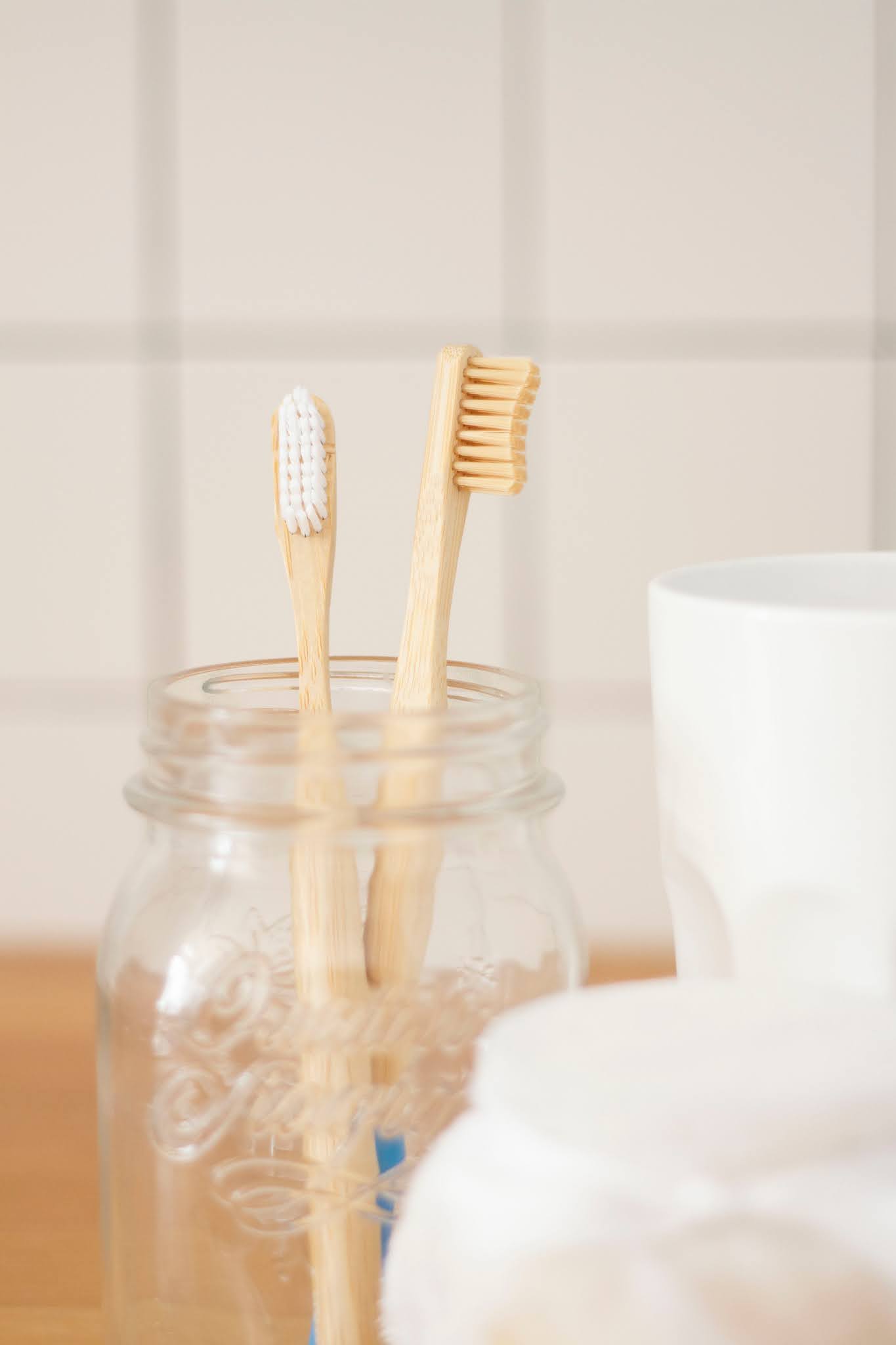Simple swaps really make for the best swaps, especially when you're just transitioning to zero waste, that's not the time to get all the answers on how you're gonna swap your favourite perfume, or your most used body wash, mostly because there are so many other easier steps to take first. Alongside smaller changes, like using cloth napkins instead of paper, always carrying a tote bag for any emergency grocery store run, or swapping from tea bags to bulk loose leaf tea, switching to a bamboo toothbrush was one of my first changes, as it requires such little effort for such a big impact.
For 21 out of the 25 years of my life, I've been using plastic toothbrushes, and imagining that all of those are still kicking around somewhere and will outlive me, makes me kind of crazy. On the other hand, the 12 bamboo toothbrushes I've used over the past three years are all accounted for, either resting in the compost, slowly decomposing, or dotted around the house to clean my shoes, tiles, and even my keyboard, and even those will later join the other ones once the bristles are removed.
The Brand I Use
The bamboo toothbrushes I use, and have done so since the start, are the ones from The Bam & Boo, which I've mentioned so many times before. I've chosen The Bam & Boo because they're a Portuguese brand, which I love supporting, but also because their packaging is 100% biodegradable and the brush itself is made of "95% renewable sources and is 95% biodegradable." Those "95% are the bamboo handle, the paper carton and the PLA bag. The remaining 5% are the bristles which are made from Nylon 6 BPA free.". The brand has chosen to use these bristles because "they are still the best way to grant a good oral care" and keep them vegan, although they're still looking for more viable alternatives to cope with those remaining 5%.
A few other reasons why I love this brand so damn much is because of their subscription service, where you can choose whether you get your new toothbrush every month or every 2, 3 or 4 months. Also, they're absolutely transparent about how sustainably the bamboo itself is sourced and how their production partners are certified for "quality management to environmental management or healthy and safety management".
Why Use a Bamboo Toothbrush
By now you're all aware that plastic toothbrushes account for a huge global waste problem, that's because plastic is cheap, versatile and easier to use and manufacture. From straws to water bottles, plastic bags to cotton buds, the list is never ending, but it's entirely up to us to refuse these and swap them for better alternatives.
Plastic pollution is an environmental issue of gigantic proportions, so why continue being part of the problem when you can help reduce it? Regular toothbrushes are made from non-renewable fossil fuels, being basically indestructible, which means the ones you used as a 3-year-old, are still kicking around somewhere on Earth, taking around 1000 years before finally breaking down.
Bamboo toothbrushes, on the other hand, are an eco-friendly alternative as they're made out of a renewable and sustainable source.
Taking Care of your Bamboo Toothbrush
- Rinse - Once you've used your brush make sure to rinse the bristles to remove any remaining bits of toothpaste or food;
- Dry - Dry both the bristles and handle with a towel, you really shouldn't skip this step to prevent any mold from forming.
- Store - Make sure you let the brush fully dry between uses, you can purchase a toothbrush holder or make your own, as long as you make sure the tip isn't sitting on a pool of water.
How to Dispose of It
- Remove the bristles - with a pair of pliers, and a tray under your brush to hold everything, pull the bristles out of the head, making sure not to pull too many at once.
- Recycle the bristles - because the bristles are so small, you shouldn't just dump them mixed with your regular plastics, instead keep a plastic bottle and use it to store them all, once it's full, place it in the recycling bin so it can all be discarded correctly.
- Dispose of the handle - if your city has a composter, place it there, if you have your own, compost it yourself. If neither of those options are viable, you can stick the handle in your own garden or on the soil of a city park, I sometimes feed mine to one of my plants but sticking into the vase, it may take from 4 months to 3 years to fully decompose, but it will get there.
- Reuse or recycle - if you'd like to reuse your brush you can keep the first three steps for later. Until then you can use it to clean tiles, tricky spots, shoes...





